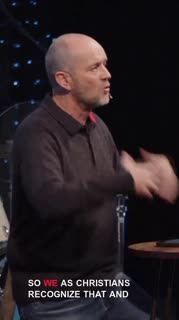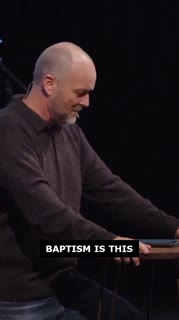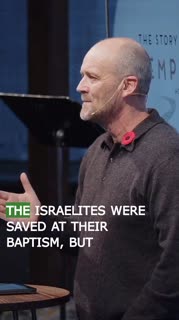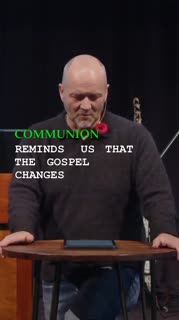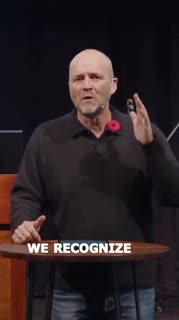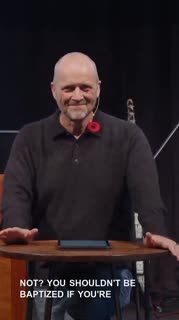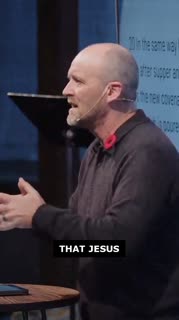Embracing Faith: The Power of Baptism and Communion
Summary
In today's gathering, we celebrated the profound significance of baptism and communion as expressions of our faith and identity in Christ. Baptism is a powerful symbol of God's ongoing work in our lives, a public declaration of our faith, and a testament to the transformative power of Jesus' death and resurrection. It mirrors the Israelites' deliverance through the Red Sea, a pivotal moment in their journey from slavery to freedom, and serves as a reminder that God is continually shaping us as His people. Baptism is not a means of salvation but an expression of the salvation that has already occurred in our hearts. It is a statement of reality, a physical act that signifies a spiritual work of God within us.
Communion, on the other hand, is an ongoing ritual of remembrance, a practice that connects us to the story of Jesus' sacrifice and resurrection. It is a reminder of the new covenant established through His blood, a covenant that delivers us from sin and death and grants us new life. This act of remembrance is crucial because, as humans, we are prone to forget. The story of the Exodus and the institution of the Passover serve as reminders of God's deliverance and faithfulness. Similarly, communion reminds us of the gospel's transformative power and our need for Jesus' ongoing work in our lives.
As we partake in these sacraments, we are reminded that we are not alone. We are part of a community, a body of believers who support and encourage one another in our spiritual journeys. Baptism and communion are not just personal acts of faith; they are communal experiences that bind us together as the body of Christ. They remind us that we are called to live in community, to embrace and be embraced by the church, and to live out our faith in the world.
Key Takeaways:
- Baptism as a Declaration of Faith: Baptism is a profound declaration of faith, symbolizing the spiritual transformation that has already occurred in our hearts. It mirrors the Israelites' deliverance through the Red Sea, reminding us of God's ongoing work in our lives and our identity as His people. [32:28]
- Communion as a Ritual of Remembrance: Communion is an ongoing ritual that connects us to the story of Jesus' sacrifice and resurrection. It serves as a reminder of the new covenant established through His blood, delivering us from sin and granting us new life. [46:46]
- The Importance of Community: Both baptism and communion emphasize the importance of community in our spiritual journeys. We are called to live in community, to support and encourage one another, and to embrace the church as the body of Christ. [57:03]
- The Power of Remembrance: The story of the Exodus and the institution of the Passover highlight the importance of remembrance. As humans, we are prone to forget, and these rituals serve as reminders of God's deliverance and faithfulness throughout history. [42:54]
- Living Out Our Faith: Baptism and communion are not just personal acts of faith; they are communal experiences that bind us together as believers. They remind us of our call to live out our faith in the world, to be shaped by God's work, and to declare His story to others. [53:07]
Youtube Chapters:
- [00:00] - Welcome
- [02:00] - Baptism as a Celebration
- [05:30] - Introduction to Exodus
- [10:15] - God's Pattern of Redemption
- [15:45] - Shaped as God's People
- [20:30] - Leviticus and God's Promises
- [25:00] - Baptism and the Red Sea
- [32:28] - Baptism as a Declaration
- [35:29] - The Role of the Church
- [42:54] - The Power of Remembrance
- [46:46] - Communion as a New Ritual
- [49:28] - The Disciples' Need for Remembrance
- [53:07] - Living Out Our Faith
- [57:03] - Communion in Community
- [59:18] - Closing Prayer
Study Guide
Bible Study Discussion Guide
Bible Reading:
1. Leviticus 26:11-13
2. Exodus 13:3, 8
3. Luke 22:19-20
---
Observation Questions:
1. What does Leviticus 26:11-13 reveal about God's relationship with His people and His promises to them?
2. In Exodus 13:3, what specific instructions does Moses give to the Israelites, and why are they significant?
3. How does Jesus redefine the Passover meal in Luke 22:19-20, and what new meaning does He give to the bread and the cup? [46:46]
4. According to the sermon, how does baptism serve as a declaration of faith and a reflection of the Israelites' deliverance through the Red Sea? [32:28]
---
Interpretation Questions:
1. How does the promise in Leviticus 26:11-13 of God dwelling among His people relate to the concept of community emphasized in the sermon? [35:29]
2. What is the significance of the ritual of remembrance in Exodus 13:3, 8, and how does it parallel the practice of communion in the Christian faith? [42:54]
3. In what ways does the new covenant described in Luke 22:19-20 transform the understanding of Jesus' sacrifice and its impact on believers' lives? [46:46]
4. How does the sermon illustrate the importance of baptism and communion as communal experiences that bind believers together as the body of Christ? [57:03]
---
Application Questions:
1. Reflect on your own baptism or the decision to be baptized. How did or would this act serve as a public declaration of your faith and identity in Christ? [32:28]
2. Communion is described as a ritual of remembrance. How can you ensure that this practice remains meaningful and not just a routine in your spiritual life? [46:46]
3. The sermon emphasizes the importance of community in our spiritual journeys. How can you actively contribute to and engage with your church community to support and encourage others? [35:29]
4. Consider the power of remembrance in your life. What are some practical ways you can remind yourself of God's faithfulness and deliverance in your personal journey? [42:54]
5. How can you live out your faith in the world, as encouraged by the sermon, and declare God's story to others in your daily interactions? [53:07]
6. The sermon mentions the need for ongoing confession and participation in the gospel. What steps can you take to deepen your relationship with Jesus and continually seek His work in your life? [49:28]
7. Reflect on the role of the church in your spiritual walk. How can you embrace and be embraced by your church community to grow in your faith and support others in theirs? [57:03]
Devotional
Day 1: Baptism as a Symbol of Transformation
Baptism is a profound declaration of faith, symbolizing the spiritual transformation that has already occurred in our hearts. It mirrors the Israelites' deliverance through the Red Sea, reminding us of God's ongoing work in our lives and our identity as His people. Baptism is not a means of salvation but an expression of the salvation that has already occurred in our hearts. It is a statement of reality, a physical act that signifies a spiritual work of God within us. As we reflect on baptism, we are reminded of the transformative power of Jesus' death and resurrection, and how it shapes our identity in Christ. [32:28]
"For I do not want you to be unaware, brothers, that our fathers were all under the cloud, and all passed through the sea, and all were baptized into Moses in the cloud and in the sea." (1 Corinthians 10:1-2, ESV)
Reflection: Think about your own baptism or the concept of baptism. How does it remind you of the transformation God has worked in your life? What specific changes have you seen in yourself since you embraced your faith?
Day 2: Communion as a Connection to Christ's Sacrifice
Communion is an ongoing ritual that connects us to the story of Jesus' sacrifice and resurrection. It serves as a reminder of the new covenant established through His blood, delivering us from sin and granting us new life. This act of remembrance is crucial because, as humans, we are prone to forget. The story of the Exodus and the institution of the Passover serve as reminders of God's deliverance and faithfulness. Similarly, communion reminds us of the gospel's transformative power and our need for Jesus' ongoing work in our lives. [46:46]
"And he took a cup, and when he had given thanks he gave it to them, saying, 'Drink of it, all of you, for this is my blood of the covenant, which is poured out for many for the forgiveness of sins.'" (Matthew 26:27-28, ESV)
Reflection: As you prepare to take communion, consider what it means to you personally. How does it help you remember and connect with the sacrifice of Jesus? What specific aspect of His sacrifice resonates with you today?
Day 3: The Role of Community in Faith
Both baptism and communion emphasize the importance of community in our spiritual journeys. We are called to live in community, to support and encourage one another, and to embrace the church as the body of Christ. These sacraments are not just personal acts of faith; they are communal experiences that bind us together as believers. They remind us that we are not alone and that we are part of a community that supports and encourages us in our spiritual journeys. [57:03]
"And let us consider how to stir up one another to love and good works, not neglecting to meet together, as is the habit of some, but encouraging one another, and all the more as you see the Day drawing near." (Hebrews 10:24-25, ESV)
Reflection: Reflect on your role within your faith community. How can you actively support and encourage others in their spiritual journeys? What is one specific action you can take this week to strengthen your community?
Day 4: The Power of Remembrance
The story of the Exodus and the institution of the Passover highlight the importance of remembrance. As humans, we are prone to forget, and these rituals serve as reminders of God's deliverance and faithfulness throughout history. Communion, in particular, serves as a powerful reminder of the gospel's transformative power and our need for Jesus' ongoing work in our lives. By remembering, we are reminded of God's faithfulness and His promises to us. [42:54]
"Only take care, and keep your soul diligently, lest you forget the things that your eyes have seen, and lest they depart from your heart all the days of your life. Make them known to your children and your children's children." (Deuteronomy 4:9, ESV)
Reflection: What are some specific ways you can incorporate remembrance into your daily life? How can you ensure that you do not forget God's faithfulness and deliverance in your own life?
Day 5: Living Out Our Faith in the World
Baptism and communion are not just personal acts of faith; they are communal experiences that bind us together as believers. They remind us of our call to live out our faith in the world, to be shaped by God's work, and to declare His story to others. As we partake in these sacraments, we are reminded of our responsibility to live out our faith in the world and to share the transformative power of the gospel with others. [53:07]
"In the same way, let your light shine before others, so that they may see your good works and give glory to your Father who is in heaven." (Matthew 5:16, ESV)
Reflection: Consider how you can live out your faith in your daily life. What is one specific way you can let your light shine before others this week? How can you share the story of God's work in your life with someone who needs to hear it?
Quotes
1. "A Christian is someone who believes a better story. We are a people of hope, a people who see that God is doing something bigger than Jesus is doing something bigger than Jesus is doing something bigger than Jesus is doing something just as what's going on in my life, are fighting to believe by faith that there is something great happening in our world, that God is bending everything in history towards his glory and he's using our lives to tell his story." ([00:28:42] (28 seconds)
)
2. "So we as Christians recognize that and say, I don't need to be the hero of my story. I don't need to be the author of my story. I can trust God to author it and I can see that Jesus is the hero. We've been working through this pattern, this kind of picture of how God moves that we drawn from both the gospel and the story of Exodus, how God first demonstrates his presence and how he then speaks his promises and then upon the faith of the people gives his power, shows his power in remarkable, powerful, resurrecting type ways and then shapes us as his people." ([00:30:43] (39 seconds)
)
3. "And so he continues to come close to them, speak to them and show his power and by doing so shapes them. He wanted them to be marked by the story and he wanted them to remember the story. He wanted them to identify amongst even the generations that didn't live through the Exodus but continue to hear the story that they were part of this powerful, profound, ongoing, continuous work. The work of God and that they would remember it." ([00:31:42] (31 seconds)
)
4. "Baptism is this awesome, continuous picture of what God does in saving people. Paul, parallels that with what the people experienced at the Red Sea, that they all experienced the presence of God overwhelming them. That they experienced this redemptive act where God brought them out of bondage and then defeated their enemies. That they participate in it to a certain degree simply by following, simply by believing, simply by acting on what they say to be true, that God is. That God is with them, that God is for them, that God is moving and that God is delivering." ([00:34:11] (45 seconds)
)
5. "The Israelites were saved at their baptism, but their ongoing, this movement forward happened after they were delivered through the Red Sea. That it's not a means of salvation, but an expression of that salvation. Baptism is not that. You don't get saved at your baptism. You're declaring something that has been done. That has previously happened spiritually. It's a physical act that signifies a spiritual work of God in our hearts. And it represents our belief in Jesus' death, burial and resurrection to give us new life. That he died for our sins, but he didn't just die for our freedom. He wanted to bless us forever." ([00:35:29] (40 seconds)
)
6. "Communion reminds us that the gospel changes everything. And so today, as with every Sunday, we remember that because we need that. We've witnessed somebody take a bold and public step. They've shared it with you as an act of trust and an act of worship. And I hope that it made you smile. We've seen and heard that Jesus is alive and is working. And then we're going to now, we're going to participate together in remembering each of us ourselves. To remember the willingness, the willingness of Jesus to pay the cost of our redemption, to eat and drink in remembrance of him, to believe that it is through his sacrifice we become God's people." ([00:58:26] (40 seconds)
)
7. "We recognize that our enemy is sin and that we are broken human beings living in a broken world. But God is close. He speaks and he delivers. That he has given us a story that is meant to transform us, that is meant to change us, that is meant to remove our shame, that is meant to give us a future of hope instead of fear, that is meant to release the need for justice and not have to be angry. He's given us this story to continue to transform us. And so we declare it once in baptism and we confess it in an ongoing way through participating in the gospel." ([00:53:33] (38 seconds)
)
8. "You shouldn't be baptized if you're unwilling to submit to the lordship of Jesus. If you're unwilling to surrender to his, his king -ness, for lack of a better word. You shouldn't be baptized if you're not prepared for opposition to your faith. Okay? In a couple weeks, we're going to talk about how when Jesus was baptized, he immediately was tempted by Satan. That what we do publicly before others in a physical sense, we're also doing as Christina prayed, as a confession to the spiritual realm as well. And that those who are baptized find themselves under the deception of Satan in a powerful and profound way, testing that commitment." ([00:54:22] (52 seconds)
)
9. "You can take communion and God will not be happier with you than the moment before all of that. But what he can do in bringing to mind that moment, he can restore us unto himself. He can say that even when you forget me as your God, that even when you abandon my presence, that even when you choose to not believe my promises, that even when you assume the truth or reject the truth, I am still here. I am still present. I am still inviting you into this dynamic relationship with myself." ([00:52:33] (33 seconds)
)
10. "That Jesus calls us righteous and then gives us a means by which to remove our shame and yet our commitment fails, right? We're half-hearted creatures. We believe white lies. We tell white lies. We justify ourselves. We fight to become the hero of our own story. We find ourselves drifting. We find ourselves lost. And yet God is kind to continue to remind us of what? That what Jesus did, he's doing, and will continue to do. And every time a believer takes communion, we're declaring once again that Jesus is the savior of the world. That it's by his blood that I am healed. That there is only new life and freedom in him. And that there is only forgiveness in his spilt blood." ([00:49:46] (43 seconds)
)

